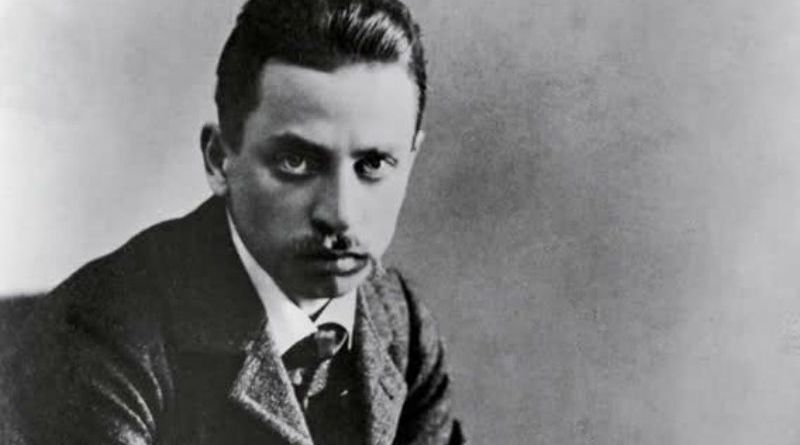
René Karl Wilhelm Johann Josef Maria Rilke (December 4, 1875 – December 29, 1926), better known as Rainer Maria Rilke, was a Bohemian-Austrian poet and novelist.
Rilke is one of the most influential modernist poets of the 20th century.
His early lyric is typical for poetry of the neo-romanticism. In the further works, developing very original symbolic cosmology, Rilke rose to new metaphysical heights, he searched dissonance reconciliations and contradictions.
Rilke was born René Karl Wilhelm Johann Josef Maria Rilke in Prague, capital of Bohemia (then part of Austria-Hungary, now part of the Czech Republic). He was born in Prague, had Austrian citizenship, wrote in German. His childhood and youth in Prague were not especially happy. His father, Josef Rilke (1838–1906), became a railway official after an unsuccessful military career. His mother, Sophie (“Phia”) Entz (1851–1931), came from a well-to-do Prague family, the Entz-Kinzelbergers, who lived in a house on the Herrengasse (Panská) 8, where René also spent many of his early years. The relationship between Phia and her only son was coloured by her mourning for an earlier child, a daughter who had died only one week old. During Rilke’s early years, Phia acted as if she sought to recover the lost girl through the boy by treating him as if he were a girl. According to Rilke, he had to wear “fine clothes” and “was a plaything [for his mother], like a big doll”.
His parents’ marriage failed in 1884. His parents pressured the poetically and artistically talented youth into entering a military academy in Sankt Pölten, Lower Austria, which he attended from 1886 until 1891, when he left owing to illness. He moved to Linz, where he attended trade school. Expelled from school in May 1892, the 16-year-old prematurely returned to Prague. From 1892 to 1895, he was tutored for the university entrance exam, which he passed in 1895. Until 1896, he studied literature, art history, and philosophy in Prague and Munich.
In the years 1886–1891, he studied in a cadet college, but, being an impressionable and sentimental youth, evaded military service, having preferred literature and the history of art. He attended lectures in the universities of Prague, Munich and Berlin.
In the 1897, he got acquainted with Lou Andreas-Salomé, who acquainted him with Russia. “Russian soul” captivated him for all the life. In Russia, he met with Leo Tolstoy, Leonid Pasternak and many other cultural figures.
In the 1900, he settled in the colony of painters Worpswede and married Clara Westhoff, a sculptor, from whom, however, he separated soon.
In the 1905, he served as a secretary of the great sculptor François-Auguste-René Rodin. He traveled across North Africa, Egypt, Spain. In the 1911 – 1912, he lived in the castle Duino on the Adriatic, by the name of which the famous elegies were called.
During the First World War, he lived in Munich. For a short time, he was in Austrian militia army, but was dismissed because of poor state of health. After the war, he lived in Switzerland.
On the 29th of December, 1926, he died from leukemia in the Valmont clinic, Switzerland.
Creative and Inspirational Work of Rainer Maria Rilke
In the 1894, the first collection of poems by Rainer Maria Rilke “Life and Songs” was published.
In the 1902, Rainer Maria Rilke entered the period of creative maturity, having proved himself as a poet by collections of verses “The Book of Hours” (1905), the two-volume “New Poems” (1907-1908); as a prose writer by the novel “The Notebooks of Malte Laurids Brigge” (1910); as an essayist by monographs “Worpswede” (1903) and “Rodin” (1905).
In the 1917-1918, he performed public reading of his poems and reports.
In the 1923, he completed series “Duino Elegies” and “Sonnets to Orpheus”.
Rainer Maria Rilke Poems
The perception of life by Rainer Maria Rilke, his works themselves, much affected by a thought about the death, were tragic. The word of the German language acquired extraordinary significance in his poems and his letters represent striking evidence of absolute devotion to the poetry.
“Letters To A Young Poet” by Rainer Maria Rilke is a prosaic work, but it is referred directly to the poetry. There are ten letters written to a young man about to enter the German military.
In the very beginning of the 1903, Rilke received a letter from a twenty-year old lieutenant of Austro-Hungarian army Franz Kappus. Verses were enclosed to the letter: the lieutenant turned out to be a poet. Probably it was not the verses that made an impression on Rilke, but it was the sincere writing, where the youth revealed his soul to another poet, who was already well- known, whom he liked.
Rilke answered. However, not regular correspondence began between them. Rilke wrote Franz Kappus ten letters; the last of them is dated by December 1908. After Rilke’s death, the letters were published in a separate book entitled “Letters To A Young Poet”. Of all Rilke’s extensive correspondence, these letters won probably the greatest popularity. It is explained by their content: there is nothing personal, private in them; Rilke wrote about the poetry, nature of poetic works, irony, loneliness, love… His philosophy-aesthetic views of that time are well reflected in these letters.

